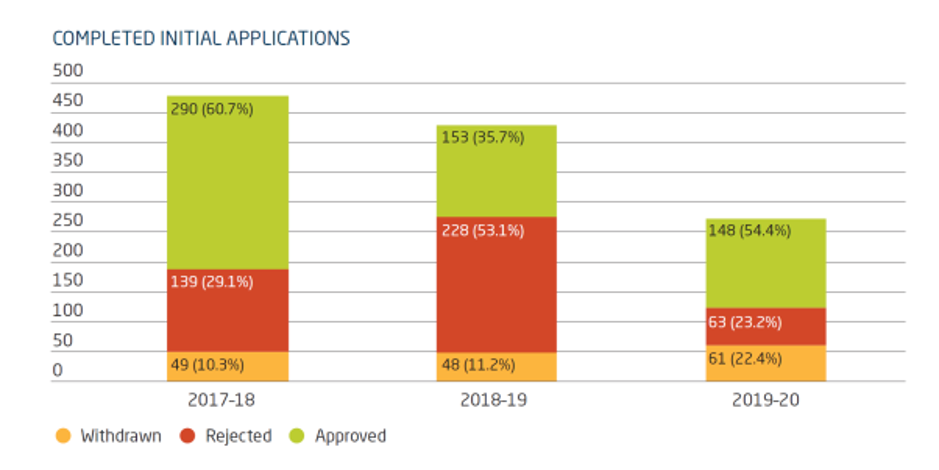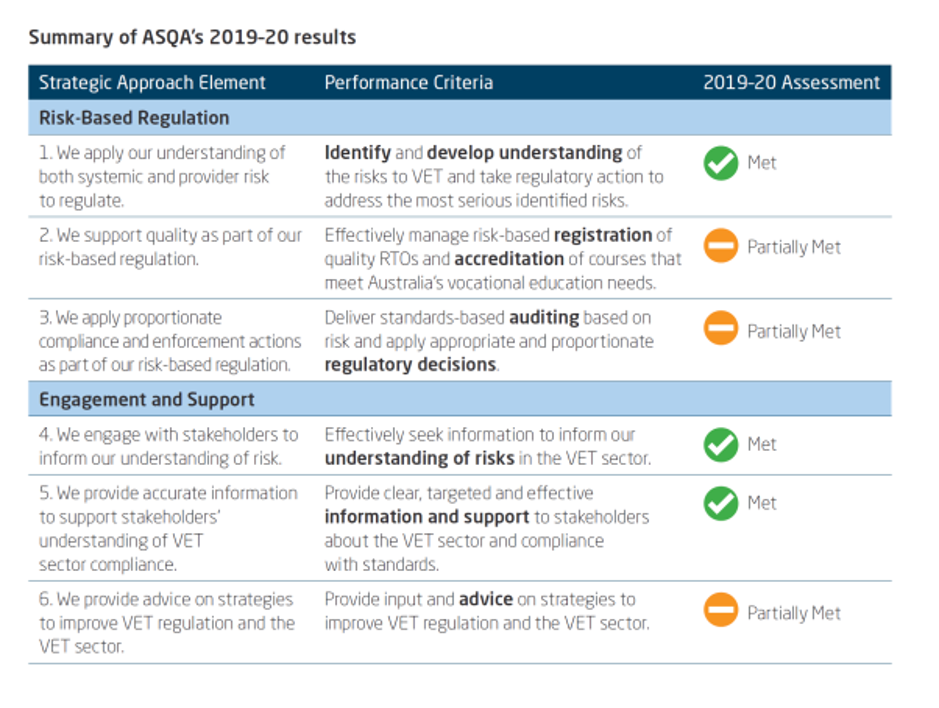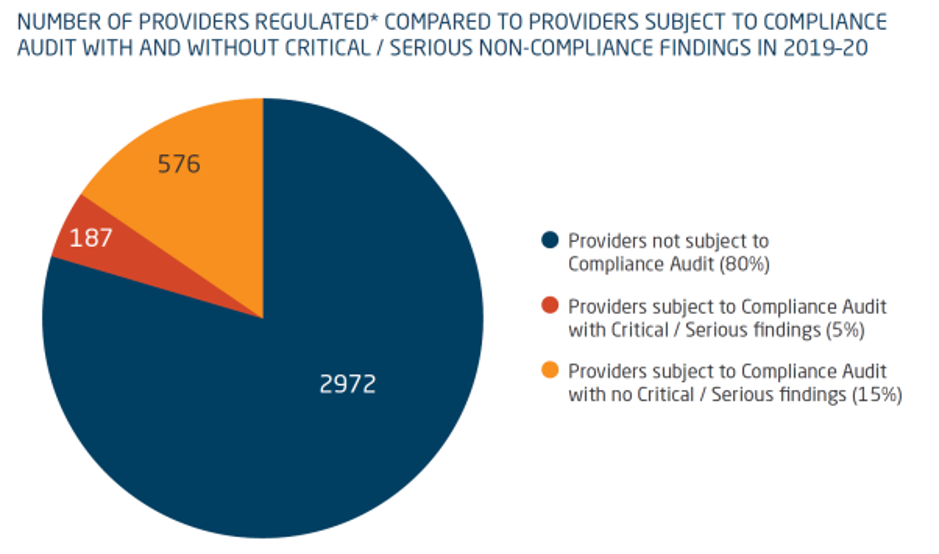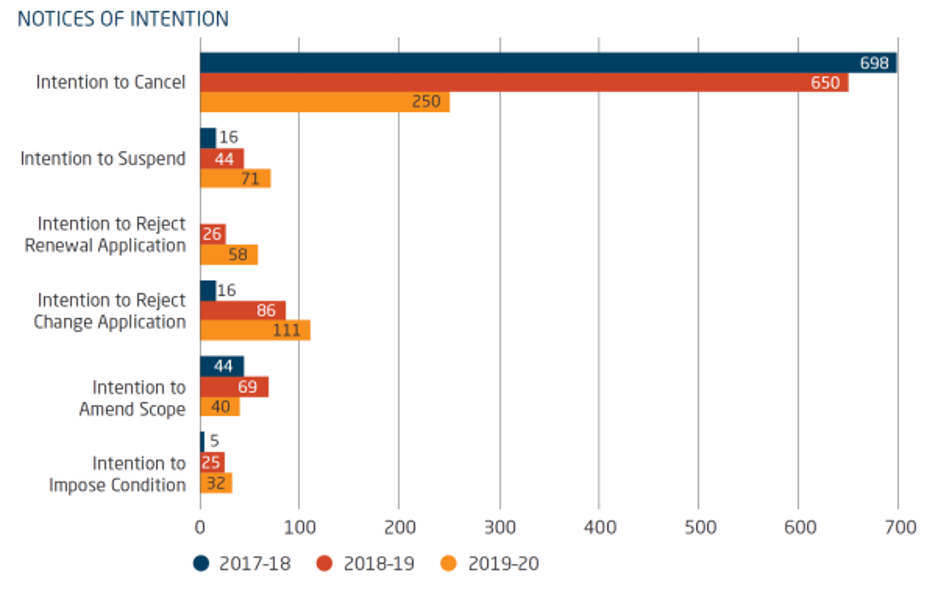Syndicated from Capstone Education, and written by Daniel Wolff.
(Capstone Education is a management and compliance consulting firm focusing on the VET sector, and is a TUTIS partner)
This is an abridged version of the full article, which is available on the Capstone Education Industry Insights blog
ASQA has released its annual report for the 2019-20 financial year, and some of what is in there is going to surprise quite a few people. Some of the data in ASQA’s latest annual report really, really put the idea that ASQA is the worst of the worst to the test.
Let’s take a look at what surprised me.
Summary of 2019-20 results
Firstly, let’s look at the summary of 2019-20 results.
This is the first time that the summary has been so clear and, frankly, honest. ASQA has copped to underperformance in three areas, including the all-important “support quality” and “apply proportionate compliance and enforcement” categories. This is good, it’s confidence inspiring.
For the rest of this article, I’m going to examine some numbers, all of which come from those two categories, which I think tell a much more compelling story than the rest of the report.
Initial registration applications
The first graph in this report which stopped me dead was this one:

What you’re looking at there is a comparison of initial registration application statistics from the last three years, and it shows that in the 2018-19 financial year more than 50% of initial registration applications were rejected and an application only had about a 1/3 chance of being approved.
In 2019-20, on the other hand, we’re up to a 50/50 chance of getting through the process, and rejections have dropped to their lowest point in three years.
The graph is showing a drop in applications from ~425 in 2018-19 to ~275 in 2019-20. Some of this will be COVID-19 related, and some of it will be related to the brutal experiences that companies had the previous year being shared through the market.
Putting aside the absolute number, and based on my own experience, 50% of applications getting through sounds about right.
If you’re enjoying this article, why not sign up for Industry Insights email updates? – https://www.capstoneeducation.com.au/sign-up
Number of audits with associated findings
Here’s the second graph that caught me:
This one is of the percentage of providers who were given a compliance audit, and what the results were.
15% of providers were audited and did not receive any critical or serious findings as a result of that audit. Only 5% of providers received an audit report with critical or serious findings.
Since only 20% of RTOs were given a compliance audit, an audited RTO had a 1/4 chance of receiving at least one serious or critical finding. Nonetheless, I cannot look you or anyone else straight in the eye and tell you that I think 5% is too high. Not by a long shot.
Notices of intention
Notices of intention are issued when ASQA is going to make a decision to, for example, close an RTO and it needs to provide a period of procedural fairness before it can do that. Here’s the graph of notices of intention for the last three years:
Firstly, you can see pretty clearly which tool ASQA reaches for as a default. There’s a whole separate question to be asked about whether this is acceptable, but it’s been asked many times and I’m not going to re-prosecute that question here.
What I WILL focus on is that this graph shows that ASQA has cut the number of notices of intention to cancel by over 60% in the last year. That’s amazing, and I am very in favour of it.
Further than this, if you cross-reference this graph with the last one, you’ll see that while 763 RTOs received a compliance audit, only 250 notices of intent to cancel were issued. Compare that to 2018-19 when 628 RTOs received a compliance audit (I got that number from the 2018-19 report rather than the graph above) and 650 RTOs received a notice of intent to cancel. I’ll take this year’s 33% ratio over the last year’s 104% ratio any day of the week.
In short, RTOs were dramatically safer from notices of intent to cancel last year than they have been for a long, long time.
My conclusions
This is only a selection of the data available in the annual report, but I believe that these data tell a compelling story.
ASQA is demonstrably getting less aggressive, more proportionate, and generally more pleasant as a regulator.
I’m not going to say that ASQA is perfect. It’s not even close to perfect. There is devil in the detail and there are still many complaints that we can make about the beast that is our regulator. I won’t say that they are perfect, and I won’t let up on calling out issues where I see them, but today… today I’m using the green pen to mark their report.
Read the full article here https://www.capstoneeducation.com.au/industry-insights/asqas-annual-report-a-reality-check



